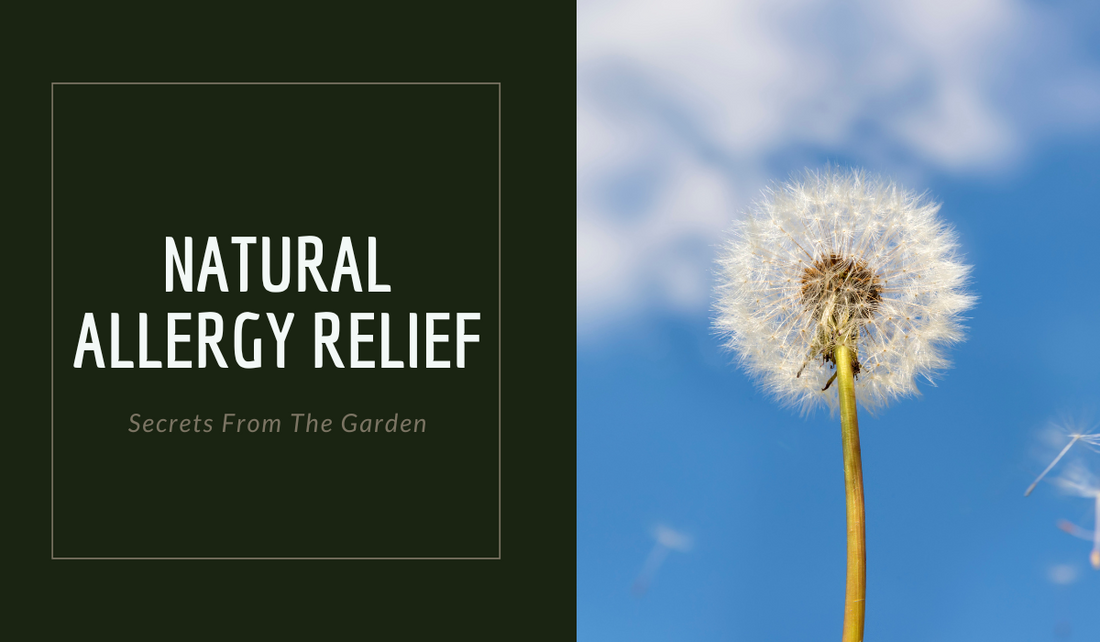
Natural Allergy Relief

What is an allergic reaction?
Allergies are a response of the immune system to an allergen, that in others may not cause a reaction. There are four types of allergic (hypersensitivity) reactions, with the first reaction being the most common, so thats what we will discuss today.
Type I reactions: Type I hypersensitivity is an allergic reaction that is immunoglobulin E (IgE)-mediated. On re-exposure to a specific antigen, the antibody IgE causes mast cells and basophils to release histamine and other inflammatory mediators. A local or systemic reaction occurs soon after exposure to the allergen that may include allergic rhinitis, asthma, a rash, gastrointestinal symptoms, and/or cardiovascular symptoms and in its severest form can cause anaphylaxis. House dust mites, pollen, certain foods (shellfish, peanuts, and milk, in particular), and animal dander are common allergens.

Natural prevention?
There are many ways we can naturally prevent our immune system from a systemic or local reaction. When we "feed" and nourish our bodies with high quality foods that have naturally occuring antihistamines in them, we absorb those benefits at a cellular level. Allowing our immune system to make the connection that it does not need to over-react, but rather to respond.
Gut lining
The epidermis of the gut is one of two surfaces that protect us from the outside world. Because our epidermis needs to both allow water and nutrients in and keep pathogens out, there are many immune cells in our gut ready to fight any invaders before they get into the general circulation. In fact, research has found that nearly 70% of our immune system cells are located in the gut, mostly in the small intestine. Thus, there is a clear tie between the health of the gut and the ability of an individual to ward off illness. This is why feeding yourself high quality organic farm raised meat, fresh in-season produce (biophotons), healthy NATURAL fats ( to help absorbtion of nutrients) is important. The quality of our food varies, with micro and macro nutrients being much, much higher in locally raised cattle, produce and even local honey. The higher the quality of food, the higher your gut epidermis is!!
Honey
One of the best ways to allow your body to become more used to the local allergens to which you are reacting, is by actually putting them in the body. Locally made honey is a great way to do this because it contains the allergens from the area, but you need to start before allergy season as it will take your body some time. Local honey can be found at farmer’s markets and locally-based grocery stores. Raw honey is highly recommended due to the fact that honey is typically exposed to heat and therefore may lose the natural enzymes and antioxidants that are also beneficial for the body. Honey has also been known to aid digestion and help eliminate coughing for respiratory infections.
Apple Cider Vinegar
Vinegar has been regarded by cultures for centuries as a remedy for various health concerns including helping reduce allergy symptoms. Apple cider vinegar reduces the production of mucus, a common side effect of airborne allergies. Furthermore, it cleans the lymphatic system, which consists of the lymph nodes, lymph vessels, and organs. The lymphatic system is responsible for fighting infections, and when it becomes congested, this function may be compromised, putting allergy suffers at risk for developing a sinus infection. Additionally, organic and unfiltered apple cider vinegar has many healthy proteins, enzymes, and helpful bacteria, which is great for the stomach. It also contains pectin, which is known to help ease intestinal spasms.
Neti Pot and Saline Rinse
A great way to minimize allergy symptoms is to cleanse the nasal passages using a neti pot and saline rinse. Nasal irrigation washes out the mucus and thins secretions, which reduces nasal congestion, and drains the sinus cavities, which prevents allergens and other contaminants from causing infection. Regular nasal cleansing helps a person’s ability to breathe and also prevents upper respiratory infections. It has also been known to reduce snoring and nose bleeds, and improve the sense of taste and smell. Just remember to clean your Neti pot regularly!
Nettle
Nettle has been shown to inhibit tryptase, an enzyme that is released alongside histamine and which promotes its effects. Inhibiting this response is useful in reducing allergic reactions. Highest concentration of these antiinflammatory benefits are in freeze dried Nettle. For safety, please contact me, or work with a qualified herbalist who is trained in proper phytotherapy dosing and possible contraindications (if you’re taking any allopathic medications or OTC supplements.) That way, we can help you navigate a dosage that is personal for you based on weight, age, and if the cause of concern is chronic or acute. To purchase nettle, click the image below.



